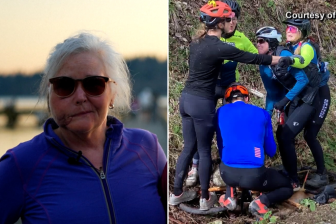New machine at Glenrose hospital helping patients with artificial limbs, orthotic devices
The Glenrose Rehabilitation Hospital in Edmonton is now home to a new machine that is greatly improving the fitting of artificial limbs, braces and other orthotic devices for patients.
The hospital has upgraded from a three- to a seven-axis robotic carver. The machine allows orthotists and prosthetists to replace traditional time-consuming plaster methods with a faster digital approach.
The carver uses 3D-shape capture and design software and automated model carving to replicate anything from head to foot. It can develop models to create prosthetic limbs, orthotic braces and wheelchair cushions.
The machine can carve models within five to 20 minutes, speeding up the previous process.
“If you think of the challenge of making a plaster cast of a patient’s head, especially a pediatric patient, or a torso for a patient who needs a spinal brace, the process was labour intensive and time consuming for staff, and I’m sure unpleasant for patients at times,” said Andreas Donauer, an orthotist at the hospital.
“Access to the robotic carver helps speed up the process from patient assessment to fitting a patient with a limb or brace, helping inpatients get their devices sooner and improving rehab outcomes.”
Rowan McNair, 11, is one of the patients benefiting from the new machine. The Edmonton boy has a rare disorder that includes symptoms of sleep apnea. The CPAP mask he had been wearing while sleeping caused rashes and pressure sores for years. It got to the point he was unable to wear the machine.
After being referred to the Glenrose, Donauer took 3D images of McNair’s head and used the new machine to create a replica foam carving of the boy’s head. The process took only a few minutes. From there, Donauer was able to make a flexible helmet with straps for McNair’s CPAP machine, making it fit much more comfortably.
“I’m so grateful this technology was available to us,” said Angela McNair, the boy’s mother.
“The pain resulted in him not wanting to wear the mask, or ripping it off in the night. We struggled for years to find an adaptive solution to help him get through the night without discomfort.”
The 11-year-old now sleeps through the night without any discomfort.
“It helps me sleep a lot better,” he said Tuesday. “With my old CPAP, I got sores and it hurt my face. This one, I don’t get that. And my face feels a lot better with this thing.”
Staff at the hospital have been using the seven-axis machine since June 2023, after the three-axis carver they were previously using broke in November 2022.
Donors came together to contribute the $500,000 needed to buy the seven-axis robotic carving machine.
The machine is being used to carve about 50 models every month for pediatric patients at the Alberta Children’s Hospital in Calgary.
View original article here Source












